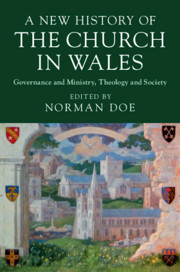Book contents
- Reviews
- A New History of the Church in Wales
- A New History of the Church in Wales
- Copyright page
- Contents
- Plates
- Contributors
- Foreword
- Editorial Preface
- Introduction
- Part I Historical Antecedents and Overview of the Century
- Part II Governance and Ministry
- Part III Doctrine, Liturgy, Rites and Other Faith Communities
- 9 The Doctrine of the Church
- 10 The Liturgy of the Church
- 11 The Rites of Passage
- 12 The Church and Other Communities of Faith
- Part IV The Church and Society
- Part V Conclusions
- Bibliography
- Index
- Plate Section (PDF Only)
9 - The Doctrine of the Church
from Part III - Doctrine, Liturgy, Rites and Other Faith Communities
Published online by Cambridge University Press: 22 February 2020
- Reviews
- A New History of the Church in Wales
- A New History of the Church in Wales
- Copyright page
- Contents
- Plates
- Contributors
- Foreword
- Editorial Preface
- Introduction
- Part I Historical Antecedents and Overview of the Century
- Part II Governance and Ministry
- Part III Doctrine, Liturgy, Rites and Other Faith Communities
- 9 The Doctrine of the Church
- 10 The Liturgy of the Church
- 11 The Rites of Passage
- 12 The Church and Other Communities of Faith
- Part IV The Church and Society
- Part V Conclusions
- Bibliography
- Index
- Plate Section (PDF Only)
Summary
While the Church in Wales still adheres to the pre-disestablishment historic formularies, its doctrine has changed much since 1920. During the first half of the century, it was catholic and conservative. However, when a Doctrinal Commission was established in 1969 there were enough Welsh Anglican theologians to staff it. This impacted on doctrinal development, as did the resurgence of evangelicalism in the 1960s, a decade which also saw the rise of modern theology, new patterns of behaviour, and new attitudes to gender. By the end of the century, new attitudes to sexuality were also evident. These changes were a challenge to the conservative, catholic inheritance of the Church in Wales, and to the evangelical tradition. While controversies about ordaining women are now largely in the past, doctrinal controversy about sexuality shows no sign of abating. The work of the Doctrinal Commission has been welcomed for its comments on ecumenical texts, though in other areas its work has had a mixed history, particularly its relationship with the Bench of Bishops.
- Type
- Chapter
- Information
- A New History of the Church in WalesGovernance and Ministry, Theology and Society, pp. 161 - 178Publisher: Cambridge University PressPrint publication year: 2020

